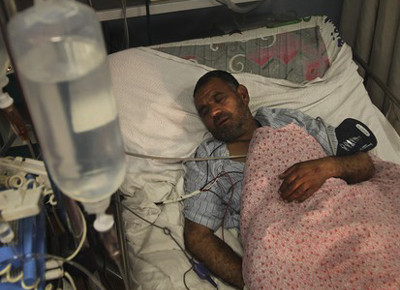By Anna Mulrine
Are Americans getting a clear picture of just how war in Afghanistan is going?
In bracing testimony before a House Oversight and Government Reform subcommittee this week, top US military officials warned that they are not.
The hearing centered around the US-funded Dawood Military Hospital in Afghanistan. It’s hardly a household name stateside, but evidence of the “Auschwitz-type” conditions, as one lawmaker put it, and allegations that US military commanders covered it up to put a better face on the Afghan war have caused a firestorm of controversy.
The medical care of patients at the hospital includes “some of the most horrific, horrendous things I’ve ever seen,” raged Rep. Jason Chaffetz (R) of Utah, who chairs the House Oversight and Government Reform’s Subcommittee on National Security, Homeland Defense, and Foreign Operations. “Allowing surgery to go on without anesthetics, gangrene, open wounds that aren’t being dressed.”
Afghan hospital staffers reportedly demanded bribes in order to treat patients, which included Afghan soldiers fighting alongside US troops in the war. If staffers were denied payments by the families, the patients did not receive care.
Representative Chaffetz leveled yet another grave charge: “That there was an effort to not allow the inspector general to get in there because the generals and others on the ground really wanted a positive story coming out of Afghanistan, rather than solving the problem.”

In this photo taken on Dec. 19, 2010, a wounded Afghan soldier recuperates at Dawood National Military Hospital in Kabul, Afghanistan. The U.S. funded hospital was investigated for widespread corruption, graft and poor patient care. (Photo: Altaf Qadri/AP)
This was the testimony of two retired colonels Tuesday. “What this hearing should be about are attempts to over-control the message,” said retired Army Col. Gerald Carozza, Jr., who was chief of legal development assisting the Afghan Army and Defense Ministry. “It is about some leadership that puts the best foot forward and relies on the hard-built reputation earned by the military.”
But that was a reputation that was misused, says another officer who charged that a top US commander, Lt. Gen. William Caldwell, sought to conceal revelations surrounding the hospital rather than launching an investigation.
Lt. Gen. Caldwell, who headed the training mission in Afghanistan, “was visibly upset” about the possibility of a US military inquiry into the hospital, says Col. Mark Fassi, then-inspector general for the training command. “His first response to me was, ‘How could we make that request with the election coming?' ” he told the subcommittee.
The US military is currently investigating allegations against Caldwell, who was not invited to testify at the hearing. A spokesman for Caldwell says he would “welcome the opportunity to respond to any inquiry” and that “all allegations will be proven false.”
It is not the first time that US military commanders have been accused of painting a too-rosy picture of the US war effort.
In a military journal article published in February, Lt. Col. Daniel Davis argued that not only is the war in Afghanistan not going well, but also that his fellow US military officers – whether due to a misguided “can do” spirit or a fear of repercussions within their chains of command – are misleading the American people.
This apparent lack of candor, in turn, is creating what Davis called a “credibility gap,” making it impossible to allow US citizens and lawmakers to “decide if the risk to blood and treasure” inherent in America’s wars is “worth it.”
Citing a 2011 report by an Afghan organization, Davis charged that US military assessments routinely differ from those of other international military forces in the country and are “solely intended to influence American and European public opinion ahead of the withdrawal.” He added, “I’m hardly the only one who has noted the discrepancy between official statements and the truth on the ground.”
Pentagon officials say that there have been positive developments in the wake of discoveries of patient mistreatment at Dawood, “I would point out that some of the problems we saw at the hospital have in fact been resolved, corrective measures have been taken, and patient care was improved as a result,” Pentagon Press Secretary George Little told reporters Tuesday.
Col. Schuyler Geller, the former Command Surgeon of the NATO Training Mission in Afghanistan who also testified at the hearing, confided to lawmakers that he’s not so sure about that.
Doctors and nurses who committed "unspeakable" acts still "walk the halls of the hospital,” he said, “unrepentant, unscathed, and unprosecuted."



